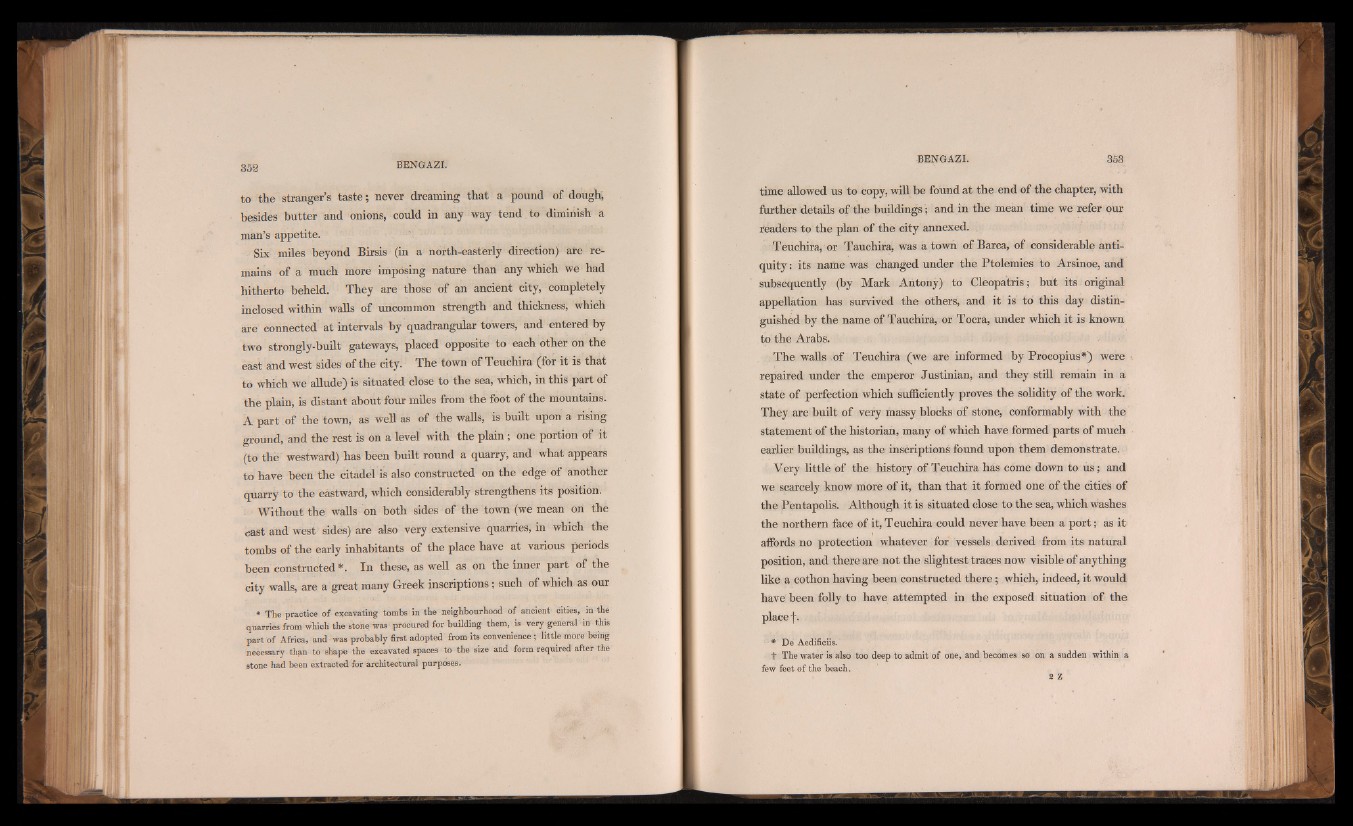
to the stranger’s taste; never dreaming that a pound of dough;
besides butter and onions, could in any way tend to diminish a
man’s appetite.
Six miles beyond Birsis (in a north-easterly direction) are remains
of a much more imposing nature than any which we had
hitherto beheld. They are those of an ancient city, completely
inclosed within walls of uncommon strength and thickness; which
are connected at intervals by quadrangular towers, and entered by
two strongly-built gateways, placed opposite to each other on the
east and west sides of the city. The town of Teuchira (for it is that
to which we allude) is situated close to the sea, which, in this part of
the plain; is distant about four miles from the foot of the mountains.
A part of the town, as well as of the walls, is built upon a rising
ground, and the rest is on a level with the plain ; one portion of it
(to the westward) has been built round a quarry, and what appears
to have been the citadel is also constructed on the edge of another
quarry to the eastward, which considerably strengthens its position.
Without the walls on both sides of the town (we mean on the
east and west sides) are also very extensive quarries, in which the
tombs of the early inhabitants of the place have at various periods
been constructed *. In these, as well as on the inner part of the
city walls, are a great many Greek inscriptions ; such of which as our
* The practice of excavating tombs in the neighbourhood of ancient cities, in the
quarries from which the stone was procured for building them, is very general in this
part of Africa, and was probably first adopted from its convenience ; little more being
necessary than to shape the excavated spaces to the size and form required after the
stone had been extracted-for architectural purposes.
time allowed us to copy, will be found at the end of the chapter, with
further details of the buildings ; and in the mean time we refer our
readers to the plan of the city annexed.
Teuchira, or Tauchira, was a town of Barca, of considerable antiquity
: its name was changed under the Ptolemies to Arsinoe, and
subsequently (by Mark Antony) to Cleopatris; but its original
appellation has survived the others, and it is to this day distih-
guishéd by the name of Tauchira, or Tocra, under which it is known
to the Arabs.
The walls of Teuchira (we are informed by Procopius*) were -
repaired under the emperor Justinian, and they still remain in a
state of perfection which sufficiently proves the solidity of the work.
They are built of very massy blocks of stone, conformably with the
statement of the historian, many of which have formed parts of much
earlier buildings, as the inscriptions found upon them demonstrate.
Very little of the history of Teuchira has come down to u s ; and
we scarcely know more of it, than that it formed one of the cities of
the Pentapolis. Although it is situated close to the sea, which washes
the northern face of it, Teuchira could never have, been a port; as it
affords no protection whatever for vessels derived from its natural
position, and there are not the slightest traces now visible of anything
like a cothon having been constructed there; which, indeed, it would
have been folly to have attempted in the exposed situation of the
place ;
* Dé Aedificiis.
+ The water is also too deep to admit of one, and becomes so on a sudden within a
few feet of the beach.
2 Z